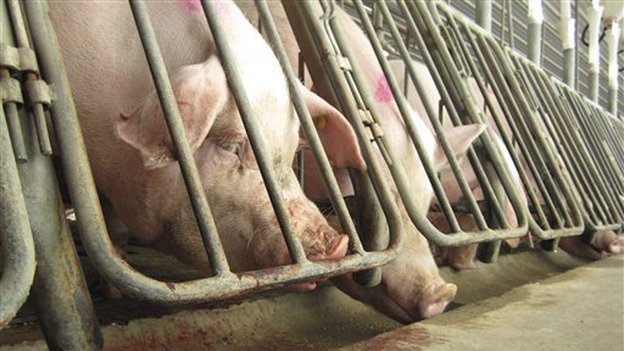The hog industry's standard practice for years has been to confine pregnant sows in the 2-foot-wide steel crates for the length of their four-month pregnancies. The idea behind the crates is to keep the sows from squashing their babies, fighting and stealing each others' food.
But animal welfare groups have long called the crates cruel and unnecessary, and pressured big producers like Smithfield to end the practice. Advocates argue that the crates restrict the animals' movement too much — the sows can't turn around at all — and are simply devices to pack as many animals into a house as possible. (Smithfield alone used 15.8 million hogs in 2012.) Group houses, by contrast, are bigger, and allow pregnant sows to come and go from their stalls.
Smithfield's announcement comes as 60 of the world's largest food retailers – from McDonald's to Safeway, Costco and Oscar Mayer – have said they won't tolerate gestation crates in their supply chains anymore, either.
In a press release, Smithfield said that the change it is requesting is not required, but contract extensions "will be less likely" for farmers who keep gestation crates.
"We recognize that these projects require a significant investment on the part of our growers," C. Larry Pope, president and chief executive officer of Smithfield Foods, said in a statement. "But a well-planned renovation to a group housing system will help maintain the farms' value for years to come, while at the same time supporting our companywide commitment to animal care."
The Humane Society of the U.S. says that Smithfield's announcement spells the eventual end of the gestation crate.
"Smithfield's announcement means certain death for the gestation crate in pork production," Matthew Prescott, food policy director for HSUS, tells The Salt. "For the millions of pigs currently locked inside these cruel boxes, that demise will be most welcomed."
Copyright 2014 NPR.
